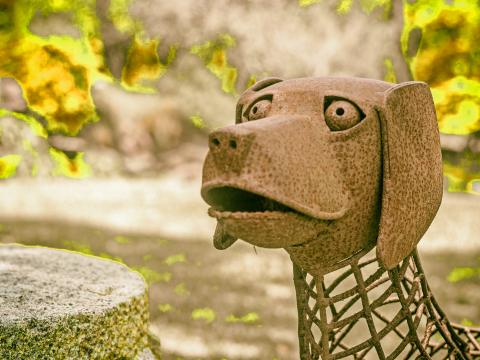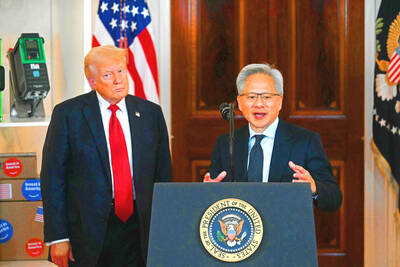Chinese Practice
蜀犬吠日(shu2 quan3 fei4 ri4)
Sichuan dogs bark at the sun

Photo: Paul Cooper, Taipei Times
照片:台北時報記者古德謙攝
The character 蜀 is a single-character name for Sichuan province, which lies to the south west of China. The Tang dynasty frontier poet Cen Shen was sent to Sichuan late on in his eventful life, in what he must have felt was a demotion. Born into a bureaucratic family in present-day Henan, he had befriended major Tang poets such as Tu Fu and Gao Shi, supported the loyalist cause against the An Lushan Rebellion and enlisted in the army to fight on the frontier, and had a hard time adapting to the environment in the relative backwater of Sichuan in his last posting.
The idiom 蜀犬吠日 literally means “Sichuan dogs bark at the sun.” In his account zhaobeikewen (招北客文), Cen laments the region’s incessant rain and humidity, and writes 『終年霖霪,時復日出,狺狺諸犬,向天吠日。』: “it rains all year round: the few times the clouds do break, snarling dogs bark up at the sun.”
Cen’s intention was to describe how much a rarity being able to see the sun was, using the dogs’ reaction for imagery. However, in modern usage, 蜀犬吠日 concentrates instead on the dogs’ response: in normal circumstances, such a reaction of surprise — almost indignation — to such an ordinary sight appears unreasonable and unmerited. We now use it when people make a fuss due to their own ignorance of a situation.
The English phrase “much ado about nothing” has been preserved in great part because the English poet William Shakespeare used it as the title for his comedy of the same name. It is thought Shakespeare wrote Much Ado About Nothing in 1598 or 1599, but the phrase “much ado” to mean a commotion or trouble was already in use in the language in the early 1500s. The noun “ado” itself is a contraction of “at do,” dialectical Middle English for “to do.” Therefore, “much ado” originally meant “much to do.” We use the phrase “much ado about nothing” to suggest that somebody is causing a lot of unnecessary fuss over what is an inconsequential issue.
(Paul Cooper, Taipei Times)
英文練習
Much ado about nothing
「蜀」為四川省之簡稱,位處中國西南。唐代邊塞詩人岑參出塞從戎歸來後貶謫四川。岑參出身河南官宦世家,並與唐代著名詩人杜甫、高適交好,曾助唐軍剿安史之亂。岑參的一生雄奇精彩,但他很難適應四川艱困的環境。
成語「蜀犬吠日」字面上意指四川的狗對著太陽吠叫。岑參在其作〈招北客文〉中感嘆當地的雨下個沒完沒了、濕氣很重,並寫道:「終年霖霪,時復日出,狺狺諸犬,向天吠日(整年都下著雨: 偶爾放晴而雲散去,狗就對破雲而出的太陽吠叫)。
岑參此言是以狗的反應來具象形容在四川要見太陽露臉是多麼難得。然而,「蜀犬吠日」在現今的用法,反而比較偏重狗的反應:一般來說,對這麼尋常的景象有如此驚訝的反應,幾乎可說是義憤填膺,顯得很不合理且太過頭了。我們現今用這成語來形容人少見多怪,因為無知而大驚小怪。
英文片語「much ado about nothing」之所以流傳下來主要是因為英國文豪莎士比亞用它來命名其所作的一部喜劇。一般推測莎翁創作《Much Ado About Nothing》(無事生非)的時間約為一五九八年或一五九九年,但是片語「much ado」用來指騷亂或麻煩的用法在十六世紀早期就已經出現。「ado」這名詞本身是「at do」的簡縮,在中世紀英語方言中意指「to do」。因此,「much ado」原意為「much to do」。我們用片語「much ado about nothing」來指某人對無足輕重的問題製造出許多不必要的忙亂不安。(台北時報編譯林俐凱譯)

When Nvidia CEO Jensen Huang revealed on Friday last week that the company is working with the Trump administration on a new computer chip designed for sale to China, it marked the latest chapter in a long-running debate over how the US should compete with China’s technological ambitions. The reasoning has sometimes changed — with US officials citing national security, human rights or purely economic competition — but the tool has been the same: export controls, or the threat of them. Nvidia believes it can eventually reap US$50 billion from artificial intelligence (AI) chip sales in China. But it so far has

Long before numerals and arithmetic systems developed, humans relied on tally marks to count. These simple, repeated marks — often just straight lines — are one of the earliest and most widespread methods of recording numbers. Archaeological findings suggest that humans began tallying in prehistoric times. During the Late Stone Age in Africa, humans began to carve notches onto bones to create tangible records of quantities. One of the earliest known examples is the Wolf bone, an artifact unearthed in Central Europe in 1937. This bone bears notches believed to be an early form of counting. Even more intriguing

Continued from yesterday(延續自昨日) https://www.taipeitimes.com/News/lang In many Western countries, the most common form of tally marks employs a five-bar gate structure: four vertical lines followed by a diagonal slash. To form this group, one begins by drawing four parallel vertical lines, each representing one. For the fifth, draw a diagonal line across the existing four. This diagonal stroke effectively creates a distinct group of five. To continue counting, just initiate a new cycle in the same manner. A set of five tallies combined with a single vertical line next to it represents the number six. Across many Asian countries, the Chinese character

In 2024, multiple airplane accidents caused severe casualties, including a Jeju Air disaster at the year’s end. However, not all incidents ended in tragedy. Early in the year, a Japan Airlines flight caught fire after landing in Tokyo, but all 379 passengers and crew members escaped within 90 seconds. This event highlights the “golden 90 seconds” that experts emphasize — most survivors evacuate the plane within this critical window. Proper preparation ensures you can act quickly and decisively during these crucial moments when every second counts. Your survival strategy begins before takeoff. Wear long pants, a comfortable top, and